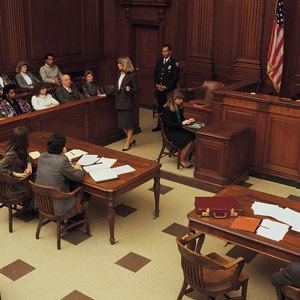
Even the most carefully-drafted trust agreements cannot possibly anticipate all future events that might limit the trustee's ability to carry-out the settlor's intentions when he created the trust. Tax laws may have changed; trust terminology may need revision, and beneficiaries may disagree over outdated distribution provisions. These issues may be addressed through the courts with the attending delays and expenses or through a nonjudicial process called a private settlement agreement.
Private Settlement Agreement
In the context of an existing trust, the purpose of a private settlement agreement is to offer a nonjudicial, yet legally binding, alternative to probate court when seeking a trust modification. As stated in the 2005 amended and revised Uniform Trust Code (UTC), "A nonjudicial settlement agreement is valid only to the extent it does not violate a material purpose of the trust and includes terms and conditions that could be properly approved by the court under this [Code] or other applicable law." Some states have adopted UTC Section 111 - Nonjudicial Settlement Agreements as written, and other states, such as Ohio, have incorporated their own versions of this provision into their state codes.
Parties to a Private Settlement Agreement
All interested parties should sign the agreement. Certainly the settlor, who created the trust, or his legal representative, if incapacitated, should be a signatory as an affirmation of the trust's original purpose. The trustee signs to acknowledge that the changes made are in the best interest of the beneficiaries for whom the trust was created, and the beneficiaries assent to the modifications with their signatures as well. Settlor or beneficiary creditors should also sign the private settlement agreement if the changes affect their loan risk.
Trust Modifications Permitted by Private Settlement Agreements
Trust issues that may be resolved in a nonjudicial private settlement agreement include establishing the proper order under the law for receipt of trust distributions among heirs and other interested parties, such as lenders and charities. Granting the trustee additional powers to effectively administer the trust, as well as making changes in the language of certain trust provisions, can avoid or stem disputes that hamper and delay trust administration. These nonjudicial but binding agreements can be used to qualify gifts for charitable gift or estate tax deductions.
Trust Changes Not Allowed in a Settlement Agreement
Under Section 5801.11 of the Ohio Uniform Trust Code, the parties to a private settlement agreement can make practically any change as long as "...it doesn't cause the trust to end before its original term date." Also prohibited would be any change that would be inconsistent with the overall objective of the trust, such as modifying a spendthrift trust provision giving creditors access to a beneficiary/debtor's distributive share. The change agreement cannot adversely alter the interests of the beneficiaries nor can it contain any stipulations that could not be approved by a court under the Ohio code. Specific prohibited settlement agreement provisions and wording may be different in your state.
References
- University of Pennsylvannia Law School: Uniform Trust Code
- Superior Court of California, County of Santa Clara. "Can a Trust Be Canceled or Amended?" Accessed July 31, 2020.
- Fidelity Charitable. "Charitable Remainder Trusts." Accessed July 31, 2020.
- Thompson Coburn. "Spinning Straw Into Gold: Modifying Irrevocable Trusts." Accessed July 31, 2020.
- Northern Trust. "Trust Protectors," Pages 1-3. Accessed July 31, 2020.
- Halliday Financial. "Trust Connection," Page 1. Accessed July 31, 2020.
- Karen S. Gerstner & Associates, P.C. "Basics - Irrevocable Life Insurance Trusts," Page 6. Accessed July 31, 2020.
Writer Bio
Sandro Puccinelli began writing motivational and inspirational pieces in 1989 as part of his managerial responsibilities for a major insurance company. His essays have appeared in various insurance industry journals, including “Forum,” “Managers Magazine” and “Insurance Selling.” Puccinelli holds a Bachelor of Arts in political science from Williams College, as well as several advanced certifications in banking and insurance.

